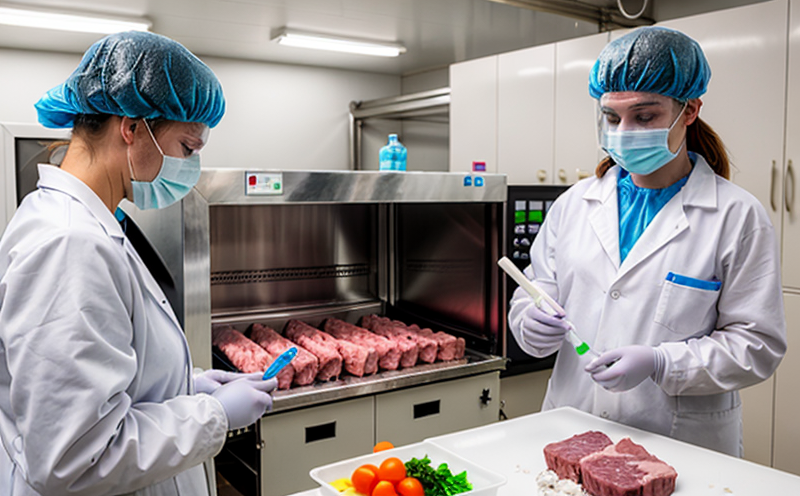USDA FSIS E. coli O157:H7 Testing in Ground Beef
The United States Department of Agriculture's Food Safety and Inspection Service (FSIS) places stringent requirements on the meat industry to ensure public health and safety. One critical test is the detection of E. coli O157:H7, a strain known for its potential to cause severe illness, including hemolytic uremic syndrome (HUS), which can lead to kidney failure.
Ground beef, being an easily accessible product that can quickly spread contamination if not handled properly, is particularly prone to E. coli O157:H7. The FSIS mandates testing for this pathogen in ground beef as part of its Hazard Analysis and Critical Control Points (HACCP) program. This ensures that consumers are protected from the risks associated with consuming contaminated meat.
The testing process involves several critical steps to ensure accuracy and reliability. Initially, raw ground beef samples are collected from various points within processing plants. These samples undergo rigorous handling procedures to prevent contamination during collection and transport. Once received at our laboratory, samples are prepared for analysis by homogenizing the meat in a buffered peptone water solution.
The next step involves culturing the sample on specialized E. coli selective media such as Sorbitol MacConkey (SMAC) agar plates. This culture medium is designed to selectively grow E. coli O157:H7 while inhibiting other non-pathogenic E. coli. After incubation, suspicious colonies are further identified using biochemical tests and serological typing methods that target the O157 antigen.
The use of advanced molecular techniques like Polymerase Chain Reaction (PCR) is also employed to amplify specific genetic sequences unique to E. coli O157:H7. This method offers a rapid, sensitive, and specific confirmation of the presence of this pathogen. Additionally, we utilize mass spectrometry-based methods for accurate identification and quantification of E. coli O157:H7 in ground beef.
The results from these tests are meticulously documented and reported to the FSIS within the stipulated timeframes. Compliance with these regulations not only ensures consumer safety but also protects the reputation of meat producers against potential recalls or legal actions.
The importance of this testing cannot be overstated, as it directly impacts public health. By adhering to these stringent protocols, we contribute significantly to reducing the incidence of foodborne illnesses related to E. coli O157:H7. Our laboratory's expertise and commitment to quality make us a trusted partner for meat processors seeking to meet FSIS standards.
Our team of microbiologists and technicians is dedicated to providing accurate, reliable, and timely results. We employ state-of-the-art facilities equipped with the latest technology to ensure that every test meets or exceeds regulatory requirements. Our goal is not only to comply but also to exceed expectations in safeguarding public health through thorough testing.
Benefits
The benefits of our USDA FSIS E. coli O157:H7 testing service are manifold, offering significant advantages to meat processors and suppliers:
- Enhanced Consumer Safety: By detecting E. coli O157:H7 early in the production process, we help ensure that only safe products reach the market.
- Compliance with Regulations: Our testing aligns perfectly with FSIS guidelines, ensuring that your operations remain compliant and avoid potential penalties or recalls.
- Improved Reputation: Demonstrating a commitment to quality through rigorous testing can enhance your brand's reputation among consumers and industry peers.
- Risk Management: Regular testing helps identify and mitigate risks before they escalate, protecting your business from costly disruptions.
- Data-Driven Decisions: Accurate test results provide valuable insights into production processes, enabling informed decision-making for continuous improvement.
- Customer Satisfaction: By ensuring the safety of your products, you can build and maintain trust with your customers, leading to long-term partnerships.
In summary, our testing service offers comprehensive support in maintaining high standards of quality and safety, thereby contributing to a safer food supply chain.
Quality and Reliability Assurance
At [Lab Name], we understand the importance of accurate and reliable results. Our commitment to quality is reflected in our robust Quality Management System (QMS), which adheres to international standards such as ISO 17025:2017 for laboratory testing.
We maintain stringent quality control measures throughout every step of the testing process, from sample collection to final reporting. Our experienced microbiologists and technicians are certified in their respective fields and undergo continuous training to stay abreast of the latest methodologies and best practices.
The equipment we use is calibrated regularly and maintained according to manufacturer guidelines. This ensures that all instruments deliver consistent and accurate results. We also conduct internal audits and external proficiency testing programs to verify the precision and accuracy of our tests.
Our quality assurance processes are designed to catch any discrepancies or errors early in the process, ensuring that only high-quality data reaches decision-makers. By upholding these standards, we provide peace of mind to our clients, knowing that their products meet the highest safety and regulatory requirements.
Environmental and Sustainability Contributions
The testing services offered at [Lab Name] not only contribute to public health but also have a positive impact on environmental sustainability:
- Efficient Resource Use: Our testing protocols are optimized to minimize waste, ensuring that resources are used efficiently.
- Energy Conservation: We employ energy-efficient laboratory equipment and practices, reducing our carbon footprint.
- Waste Reduction: By accurately identifying contaminants early in the production process, we help reduce the need for extensive post-processing steps, thus minimizing waste generation.
- Sustainable Practices: Our commitment to quality testing supports sustainable agricultural and food processing practices, promoting long-term environmental health.
In addition, our laboratory is certified under ISO 14001:2015 for environmental management systems. This certification underscores our dedication to minimizing the ecological impact of our operations while contributing positively to sustainability goals.





